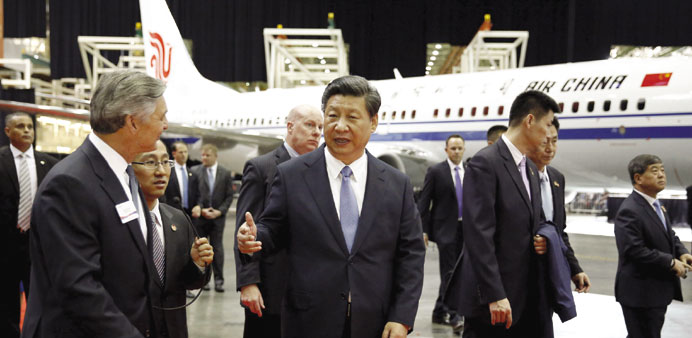Chinese President Xi Jinping (2nd left) and Ray Conner, president and CEO of Boeing Commercial Airplanes (left), tour the Boeing assembly line in Everett, Washington, on Wednesday. After Xi’s visit, Boeing announced it had received orders for 300 new aircraft from China worth $38bn — a new record for the aircraft industry.
AFP/Everett, Washington
Boeing scored a record $38bn in new orders from China as visiting President Xi Jinping delivered an “I’ve got your back” message to wary chief executives of America’s biggest companies on Wednesday.
On day two of his US trip Xi promised the heads of Boeing, Microsoft, General Motors and a dozen other top companies that they have a bright future in China’s growing economy, with Beijing committed to market and regulatory reforms that will create a level-playing field.
Having assured America a day earlier that China’s economic turbulence — which had triggered global market turmoil — was only temporary, he argued that his record for an open and liberal Chinese market, even when he was a lower official eight years ago, speaks for itself.
“I voted yes for Disney” when the US entertainment giant was pitching a new theme park in Shanghai, he said, arguing against other Chinese officials who wanted a project based on Chinese culture.
He backed the Disney project, slated to open next year, “because China needs a diverse-culture-based entertainment market.”
As if to underline the point, hours later Xi visited Boeing’s massive assembly plant near Seattle where the company announced it had received orders for 300 new aircraft from China worth $38bn — a new record for the aircraft industry.
“China is a critical international market for commercial airplanes,” said Boeing commercial aviation chief Ray Conner. “We thank Chinese customers for selecting fuel-efficient Boeing airplanes to meet their fleet growth and expansion.”
After a two-day stop in Seattle, Xi heads to Washington for summit talks with President Barack Obama aimed at reminding his host of the importance of China to US business and the US economy overall.
But the Obama administration is expected to turn the focus of the state visit to more contentious issues such as Beijing’s South China Sea expansion, human rights and cyber theft — over which Xi has already sounded less compromising. Wednesday morning in Seattle Xi held a mostly closed roundtable meeting with 30 Chinese and US CEOs, listening to and seeking to assuage their concerns over China’s economic slowdown and its tough environment for foreign investors.
“In the long run the fundamentals of the Chinese economy are good,” he told the chiefs of, among others, Amazon, Apple, Disney, Microsoft and Berkshire Hathaway on the US side, and Tencent, Baidu and Cosco on the Chinese side.
He noted that China last year became the largest recipient of foreign direct investment, $128.5bn worth, and that its growing population would need more goods and services, from cars to tourism, including those from US companies.
“China will open up still wider to the outside world: without reform there will be no driving force, without opening up there will be no progress,” he said. “We will continue to build a law-based business environment, an open environment.”
Despite the warm words Xi faces deep skepticism within the powerful American business industry, from US employees at Boeing now fearing for their jobs to accusations Beijing is not doing nearly enough to protect the intellectual property rights of US companies.
“We will stand firm to protect IPR,” he pledged.
Turning to Chinese companies, Xi said they will invest $1.25tn outside the country over the next decade and were already major employers of Americans — including, in a pointed reference, the 100 Chinese companies that have invested in the deeply depressed economy of Detroit.
He called on US business chiefs to help make things easier for Chinese investors and raised a frequent complaint they had about working in the US — US controls on technology exports to rival countries like China.
“Chinese companies also hope to see substantive steps by the US to ease restrictions on exports of civilian high-tech items to China, and create a level-playing field for Chinese investment in the US,” he said, turning the tables on his hosts.
“We count on the US business community to play your positive role and help make this a reality.”

